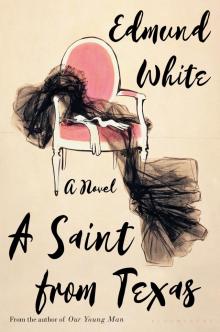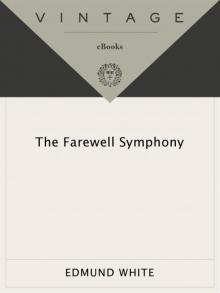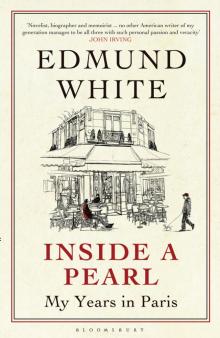- Home
- Edmund White
A Saint from Texas Page 2
A Saint from Texas Read online
Page 2
Bobbie Jean really knew how to play Daddy. She’d figured out that as a teenager he’d suffered because his parents were the poorest people in town—and Weeping Hills was one poor town, cut off from the world with only one radio for five hundred people and only one copy of one newspaper that would arrive in town once or twice a week. Daddy says he can remember that when World War I ended they didn’t know it for a whole day, until an old farmer came running over the hills shouting, “Kaiser Bill is done for!” No one ever visited except some little salesman who’d come by twice a year selling salt and needles and a special kind of cough syrup that’d drive the ladies crazy. The town couldn’t keep a doctor or a dentist because nobody had any cash money to pay them with. And Daddy’s folks were so poor, they ate for dinner what was called Martin’s supper, toast soaked in bacon drippings. They couldn’t afford anything; their house was falling down and hadn’t had a lick of paint for an age. That kind of poverty is humiliating, even in a godforsaken one-street town like Weeping Hills.
Our Daddy always wanted to be a big shot. When he was in college for two years in San Marcos, he had to work all the time and even take off one semester to break rock on the state highway. Then, later, he got himself elected to the state government in Austin, but there he earned only six bits a day and four went to room and board. He found other jobs but they were hard as hell and he never could get ahead of his debts until an acre he owned in Ranger, Texas, came in with oil, black gold, and for ten good years he was saving nine-tenths of it. Our poor mother had to break her back washing the sheets once a week in the bathtub, though Daddy bought her a mangle to wring the water out before she hung those heavy sopping things on the line. He refused to hire a woman to help with the ironing or the cooking or the housecleaning. He thought Mama was a healthy woman and should work. He would expect her to polish his boots and wait on him. “Sugar,” he’d say, “mo’ pie.” But then she died of TB and exhaustion at forty-nine, and while he was in mourning Daddy read the diary she’d kept all those silent, uncomplaining years. He wrote in the margins, “Poor Angel!” and “What a varmint,” when she mentioned him. He read page after page of how he’d offended her, even left her covered with bruises, and he wrote, “This man is a monster! My poor baby, how I tortured you!” He could see how his whole myth of a happy marriage was crumbling in front of his eyes. Usually Daddy was cocksure—or so insecure he had to prove his way was the best way, the only way, and everyone around him must be envious and an enemy. But this time he sat up late every night listening to sad country music on the radio, all about cheating or broken hearts, and he read and reread Margie Ann’s diary. He was always talking but now he was silent, like a big parade balloon slowly deflating till it was small enough to slip into a hip pocket.
One morning he locked the diary and put it away and buried the key beside the grape arbor. I imagine that’s why he bowed down to Bobbie Jean’s least wish: he was repentant and she was hard where our mother was soft. She knew what she wanted, whereas Mama was always dithering, fixing to find out what you wanted.
And then Bobbie Jean kept hammering on about us girls, how we deserved every opportunity money could buy, how we’d lost our mother, whom Daddy had worried and worried into an early grave, how I deserved a debut as lavish as the Hope Diamond and precious Yvette had the right to a first-class education in Greek and Latin and French and Texas history and domestic science!
Six months later we were living in the Turtle Creek White House, with its columned portico, though the lot wasn’t that big, nobody’s was. Bobbie Jean hired a cook and a maid but, boy, was she mean to them! They were colored girls and she paid them tiny salaries. She called the cook Pinky—maybe that really was her name—and Bobbie Jean gave them some sort of dog food to eat. They didn’t eat what we ate, which often enough was steak, big well-done steaks, the way country people like them. You never saw a farmer eat a rare steak. Yvette could barely swallow hers. One day Miss Yvette didn’t touch her blackberry cobbler and later Pinky told her she’d eaten it. “I never tasted that cobbler before,” she said, “though I’ve been fixin’ it since I started working at twelve.” I couldn’t be bothered, I knew there were lots of hungry people in the world; when we wouldn’t clean our plates Bobbie Jean would say, “Remember the starving Armenians,” but I doubt she could even picture them and never went to bed hungry herself. Yvette wrote a paper for our fancy private high school, our young ladies’ academy, Hockaday, on the Armenians and uncovered all those horrors, how the Turks had made them walk through the desert without food or water until they dropped like flies or something. Yvette really did remember the starving Armenians. And the Jews who died in the ovens and Lord knows what else—I didn’t want to think about all those poor people, it just made me sad.
Daddy had a great big collie. He called him Ole-Boy and said he was his best friend, and he had that big smelly thing sitting right at the huge mahogany dining table under the biggest chandelier you ever did see, Bohemian crystal, and Daddy would give him little bites of steak, though he’d make Ole-Boy beg for it with his big, imploring eyes and his upraised nose. When someone said collies weren’t that smart, Daddy said, “That must be why we get along.” Yvette learned how to give most of her steak to the dog when Daddy wasn’t looking, though Daddy got suspicious (and a little bit hurt) when his best friend sat by Yvette instead of him.
Finally Yvette announced she’d become a vegetarian and Pinky served her extra helpings of peas and carrots and grits and Ole-Boy went back to Daddy’s side. Yvette’s dislike of meat made Daddy mad, and he talked about how they’d been so poor when he was growing up he’d get an orange for Christmas, that was all he’d get, and he’d hoard his orange till it turned blue and was rotten. He was so ashamed of his daddy he’d sass him and wouldn’t mind him, that’s what Namaw told me. She was proud of him that he lived in the White House now, but he’d been lucky with oil only for ten years, nothing to brag on him about, plenty of folks were oil-rich, half the families in Turtle Creek.
I overheard Yvette once in the next room when she was studying with a friend, Duke. They didn’t know I was nearby and listening. He said, “I’m so bewitched by you, Why-Vet,” and I knew he must’ve been reciting some script or something, using a word like “bewitched.”
“Oh, come on, Duke. You can sweet-talk my sister. We’re identical twins and she likes you so much.”
I could’ve strangled Yvette for saying that, especially when he remarked, “She’s different from you. She’s brassy. She’s forward. When she’s in that little skirt doing her cheerleading …”
“Yes?”
“Well, she sprawls when she sits on the gym floor.”
I was seeing red and almost barged in then and there, but I wanted to hear what Little Miss Muffet would say. She didn’t say anything. Finally she whispered, “Let’s go back to our equation.”
“Why-Vet, I’m so bewitched by your perfume. It’s as sweet as you are.”
“Oh,” she said. “I’ll give you the rest of the bottle. Then you can put it on your hand or your pillow—”
“I don’t want to wear it myself,” he said indignantly. “I am bewitched by everything about you, your eyes …”
“If I could I’d dig them out and hand them over to you.” She said it so simply, almost childishly, that I believed her. Perhaps someday she’d really do it, though I knew she liked to read and write and she “liked the look of God’s world,” as she said. She needed her eyes.
I was about to make my presence known when I heard Duke begin to moan. He was breathing hard and gasping and whispering, “Just touch it, just touch it. Don’t you like it? Touch it! Out of … the kindness … of your heart,” and now he was breathing like a steam engine pulling out of the station. “Oh, Why-Vet, if you only knew how painful it is for us fellows, we get blue balls, they hurt so bad, just touch it, Why-Vet, or lick it just there where that clear juice is dripping out.”
“Please, Duke, leave me be. Put it away. I’m sure Why-
Von would lick it, but I don’t want to. Duke! For the love of God!”
“Just hold it in your little hot hand, please, Why-Vet, it hurts so bad. You always want to help people, you don’t like to see other people suffer.”
Yes, I thought, the sore limbs of the old and poor and afflicted, not some big red poker like yours, Duke Willens.
“Don’t, Duke, don’t!” And I thought I could hear them wrestling.
And then I coughed loudly and sang out their names: “Yvette, Duke, aren’t you done with that old math yet? I brought you some nice cold iced tea, just the way you like it, Duke, Lipton, three sugars, and cut lemon, here I come!” And I rounded the bend and there was Yvette, her dress yanked around and her hair unpouffed, and there was Duke, red-faced, sweat on his forehead, clutching his lap. I could see something poking out. I walked over to the window, pretended to look out, adjusted the air conditioner to high, and did everything very slowly. “Oh, I forgot the tea, silly me, now y’all come with me, come with me into the east wing and Pinky will bring it out with some nice Toll House cookies.”
I marched ahead, but when I looked back there was Duke Willens, zipped up but with a big old thing poking his pants with a wet spot soaking the linen just to the right of the zipper. My, I thought, that’s an abnormally big one. It would scare even me.
Just before bedtime Yvette kissed my hand, which she never did, and whispered, “Thanks!”
“What for?” I asked.
“For saving me.”
I just smiled and patted her shoulder. I wouldn’t want to be saved from Duke Willens. Why, he was the most popular boy on his school team and his folks both sang in the Turtle Creek Baptist Choir. They were lovely people, though Duke’s fat sister was stuck-up and Duke oversexed.
Yvette was a brilliant student. Daddy had to find her a special tutor in Latin and Greek, which she learned extra-fast because she wanted to read Plato in the original and the Greek tragedies and Cicero’s Treatise on Friendship and Old Age. She picked up Spanish anyway tutoring José the gardener’s kids in English and math. She loved tutoring children, but she said she had no desire to give birth to her own.
“But why not?” I asked. That girl kept me stumped, though we were identical.
“That’s not my destiny,” she said.
“How do you know that? I don’t have a destiny. We’re only teens.”
She just smiled, her eyes unfocused, as if she’d just ridden through a car wash, the windows being scoured in a deluge.
She heard from José how Mexican people were staggering across the desert, sleeping on the sand, skipping meals, and broiling in the sun. That broke her heart. I’d catch her crying her eyes out. She started sleeping on the floor and refused to eat. She got so skinny her monthlies stopped. Daddy was furious but silent and drove her to the doctor’s.
The doctor was a fake Texan, actually from New Jersey, but he wore cowboy boots and a ten-pound belt and a blue shirt snapped shut with pearl pressure buttons, and he had long white hair to his shoulders like Buffalo Bill. White chest hairs poked out of his shirt between buttons. His office was meat-locker cold. He took a friendly, avuncular approach. “Well, now, young lady, you’d be a lot prettier if you ate. Look at your twin—as pretty as a Texas bluebell, everything a cowpoke would dream of on his lonely cot.”
I was sitting just beside Yvette and she set her jaw in a real ugly way and wouldn’t meet the doctor’s eye—and seized up when he said “cow-poke” in a loud, grinning, fake-Texas way. Everything he was saying was wrong and I felt sorry for my sister. He was talking to her as if she were three years old. “Now, you do me a little favor, will you? Be a good girl and eat your Wheaties in the morning and your daddy’s steak with biscuits and gravy at night.” I wondered if Yvette would begin to retch.
I could feel what she was feeling. After all, we were identical, right? But Lord knows I didn’t want to keep her company down her lonely path.
I wanted to have fun! I wanted to be popular in school and belong to the Crowd, which is what we called the neat kids. I thought with our money and my looks and smarts I could go far—I could be captain of the cheerleaders. Why, I could even be the homecoming queen. Now that I’ve risen so high and even become a baroness, you might could smile at my social ambitions as a teen, but that’s all we could dream of in Dallas in the fifties! Our yearbook motto was: “Not on the heights but climbing.”
I served on every committee back then; I was a top majorette baton twirler. I’m afraid I avoided Yvette, who grew so thin she looked all peaked and flat-chested and green and stopped peroxiding her hair and cut it all off like a boy. I can still picture her scurrying across an empty lot, her books pressed to her flat chest and her skirt nearly falling off her hips.
Just to give you an idea of how different we were, our Namaw gave us each a record player for our birthday. I was always listening to Top Ten tunes or country music, but Yvette was playing day and night Bach’s The Art of Fugue. To me it sounded like those old-fashioned IBM punch cards chattering to one another, but Yvette said it was “sublime” and like an “X-ray of God’s brain.”
At that point she was still a Baptist like the rest of us. Daddy didn’t hold with any other denomination and didn’t want us to date or socialize even with the Presbyterians, say. What would he have said if he’d seen Yvette sneaking off to Christ the King Catholic Church? (“Go, Crusaders!”) When I asked her if she didn’t get sick of praying (for she’d made a little altar in our room and was bent over it night and day), she said Bach didn’t get sick of his dozens of cantatas. I remember she was always listening to Weinen, Klagen, Sorgen, Zagen (Weeping, Lamenting, Worrying, Fearing), and she found that music written for the third Sunday of Easter—and those sentiments—electrifying. “No one ever got tired of that music,” she said, “because it was inspired by God. A hundred ways of saying Christians must suffer in this world and embrace death so we can join Our Lord.” Her devotion (and her simplicity) gave me chills. I didn’t want to hear about embracing death, which seemed years and years away, practically invisible, completely foreign to our young bodies being irrigated with blood and hormones, these pulsing warm bodies still growing and blossoming.
I became best friends with Jane Beth Smith, whom I met at school. Yvette had always been my shadow, because different as we were, we were identical. I always needed to be with her. As children we played house together and made up words and had imaginary friends, “Crêpe Suzette” and “Tom-Tom-Tony.” If we were apart a whole day I’d feel lost and start crying for my Yvette. It really felt like a big ache in my stomach. I guess you could say she was my security blanket. But now something healthy and vital in me was drawing me away from Yvette.
Jane Beth’s daddy had bought her a yellow Corvette and we rode in it all through Turtle Creek and Preston Hollow. We’d go to cheerleader practice and Jane Beth helped me through my moves and even taught me at home how to follow in slow dancing. She’d play the boy and lead me through swirls and dips. She gave me my first grown-up perfume, Je Reviens, and she taught me how to paint my toenails opalescent pink—why, she even taught me how to inhale! Lord, I coughed myself silly the first five times I tried it but then I got a taste for it and we bought ourselves some Virginia Slims.
Her parents were never around, thank God, and we’d drag boys back to her place and dance and make out and smoke every afternoon. We were pretty wild but we drank only beer and we never let the fellows get our panties off, though once or twice I took off my bra. Once a guy did get a finger in me.
Yvette spent her afternoons creeping around Christ the King or tutoring little Mexican children in English. She would concentrate so hard—she thought concentration was a form of prayer. She wanted to do factory work but I guess she couldn’t find any. Anyway, she wasn’t a union member. And who ever heard of an Anglo rich bitch working on an assembly line?
She told me she and the priest had some knockdown drag-out fights. When I asked her over what, she clammed up.
&nbs
p; “Over what they call the mysteries? Virgin birth? The resurrection?”
Yvette’s eyes went all wide on her, and her forehead? She got the crease of sincerity the way she does. “Oh, no,” she said, as if she were taking an oath, “I believe in the mysteries, every last one,” and I’d seen her literally enraptured by the crucifixion. She had an itty-bitty cross on her altar and she could … contemplate it for hours with her tears flowing.
“What you crying for?” I asked one day.
“For how he suffered for our sins.”
“I don’t have any sins, personally,” I said, “except asking Daddy twice for my allowance one week and lying I’d lost my money purse, but that was just to get extra money to buy y’all Christmas presents, so it was a good deed after all.”
She put her arms around my waist and kissed my cheek and then turned up her nose. “Ooh-ee, you smell of cigarettes!”
“Don’t tell Daddy. He’s always saying, ‘Don’t drank nor smoke,’ and he promised me a thousand dollars on our next birthday if I stayed pure.”
“He never made that promise to me,” Yvette said.
“He knows you’re not the wild one,” I said.
I wasn’t really that wild, except compared to Yvette. Yes, I kissed boys, I even drank beer and smoked Virginia Slims, but I always stayed alert. I knew that in our high school a girl can get labeled a slut if she lets a boy stick fingers in her. Oh, and those Dallas boys sure knew how to sweet-talk a girl, promising love eternal and the secrecy of the tomb. But there were no secrets. If a girl let a boy defile the holy temple of her body (just a finger up to the second knuckle), the guy would be on the phone that very night crowing about what a whore that Betty Sue (or that Yvonne) was … you see, the Crowd, the popular kids, had to stay in and study at night and not everyone had a TV and anyway the shows were mostly boring and there were only three channels. So we phoned one another. I had my own telephone line because my parents got so mad the phone was always busy. And I ran up hundred-dollar charges! A hundred dollars in those days was a fortune. But Daddy looked the other way, better his little girl was home jabbering rather than riding around in some boy’s car.

 A Saint from Texas
A Saint from Texas The Farewell Symphony
The Farewell Symphony The Married Man
The Married Man A Boy's Own Story
A Boy's Own Story City Boy
City Boy Inside a Pearl
Inside a Pearl Our Young Man
Our Young Man Jack Holmes and His Friend
Jack Holmes and His Friend